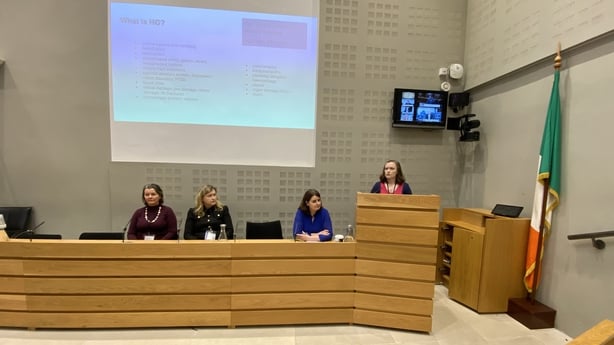There have been calls for reform of the access for women to a drug that treats nausea, headaches and severe vomiting in pregnancy.
Cariban is the first line of treatment for Hyperemesis Gravidarum (HG), but campaigners say access is limited due to the high cost, which can be €3,000 over the course of a pregnancy.
At a briefing in Leinster House, Social Democrats TD Jennifer Whitmore said the current scheme of access to the drug is failing women instead of helping them.
Ms Whitmore said the announcement in Budget 2023 that Cariban would be covered by the Drugs Payment Scheme was initially welcomed.
She said it later emerged that the devil was in the detail.
To qualify for the scheme, patients must get their initial prescription from a consultant obstetrician.
We need your consent to load this rte-player contentWe use rte-player to manage extra content that can set cookies on your device and collect data about your activity. Please review their details and accept them to load the content.Manage Preferences
She said this has caused deep frustration for women with Hyperemesis Gravidarum, as well as pharmacists, consultants and GPs.
Ms Whitmore said that in some cases, patients must wait at least 12 weeks to see a consultant, even though hyperemesis can start as early as four weeks into pregnancy.
The briefing heard that some women end up going to emergency departments to get access to the drug.
Campaigners have called for Minister for Health Stephen Donnelly to meet with representatives of Hyperemesis Ireland and work with them to make Cariban easier to access under the drug payments scheme.

This morning's briefing was attended by representatives of the advocacy group Hyperemesis Ireland and members of the medical profession, including Professor Mary Higgins, consultant obstetrician at the National Maternity Hospital and assistant professor at UCD.
Professor Higgins said that inpatients and patients attending high-risk clinics can have the relevant three-page form filled out in order to get the drug, but there are other patients who are struggling to access it.
Speaking to RTÉ's News at One, she said: "The issue is for people who have chosen to access midwifery-led care, people who are going to see their GP because they're in the first trimester, there isn't a clear pathway of how they access Cariban.
"We do feel that we're in a much better position than we were last year and we're very grateful that the HSE and the Department of Health are actually funding this.
"But we would like to advocate that there's easier access for women, that it is more patient-centered, and that involving the clinicians in the pathways of how we develop this will help us give feedback on how it can be most efficient for women and pregnant people."
In a statement, the Department of Health said Minister Donnelly has asked the Health Service Executive to review the current arrangement around the prescription of Cariban.
It said that because Cariban is an unlicensed product, an exceptional arrangement was put in place which requires that the initial prescriber must be a consultant.
The department added that the minister recognises that "women who may benefit from Cariban may require access to it before their first consultation with their specialist/obstetrician, and that GPs appear to already be prescribing Cariban without an initial prescription from a specialist".
It added that in the recent Budget the Government allocated €1.3m for access to the drug from this year.
Cariban is unlicensed because the maker has not chosen to apply for a licence, not because it is inappropriate for use.
So far, 444 women have been approved for the product in Ireland.







